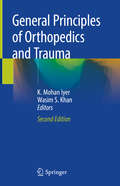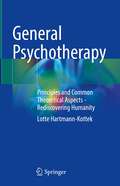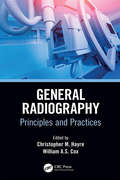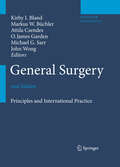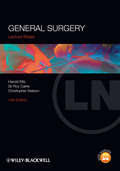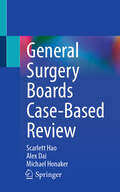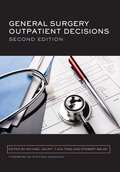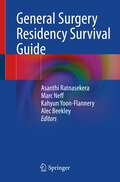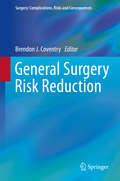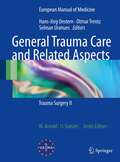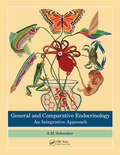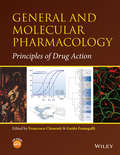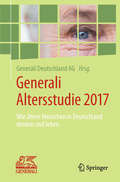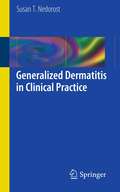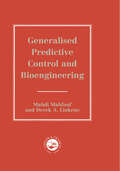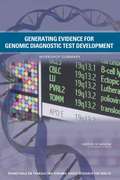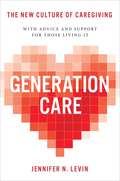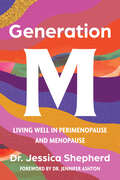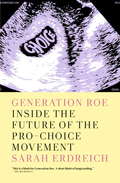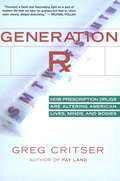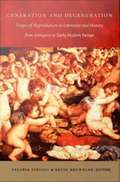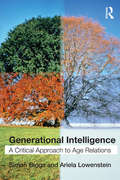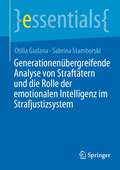- Table View
- List View
General Principles of Orthopedics and Trauma
by K. Mohan Iyer Wasim S. KhanThe second edition of this book concisely covers the most recent developments in orthopedics and trauma. It features detailed descriptions, x rays, clinical and therapeutic pathway diagrams for a number of commonly encountered disorders including fractures, metabolic disorders, bone tumors, and amputations enabling the reader to develop a deep understanding of the latest information on how to successfully diagnose and treat these patients. General Principles of Orthopedics and Trauma is an ideal resource for trainees and junior surgeons seeking an easy to follow clinical guide on how to successfully diagnose and treat patients with orthopedic and trauma disorders. It is also of use to the experienced practitioner seeking a practically applicable text on the latest advances in the field.
General Psychotherapy: Principles and Common Theoretical Aspects - Rediscovering Humanity
by Lotte Hartmann-KottekThis book highlights common similarities between the various schools of psychotherapy. It provides psychotherapists with the underlying neurophysiological, developmental psychological and relationship-oriented matrix (basic needs and their regulation, deficits, trauma and conflict processing patterns, including accompanying exercises) as well as opportunities for healing correction and stabilisation - and the ways in which to apply these methods in a therapeutically mindful way for the benefit of the patient. The new university-based psychotherapy training covers the four fundamental schools of psychotherapy, i.e. the previous standard approaches plus the systemic and humanistic ones. Focusing on the common ground builds bridges of understanding and encourages collaboration. This expanded, new range of methods to access patients constitutes a substantial development in the field of psychotherapy and will also influence the psychotherapy practice of experienced colleagues. Written for medical and psychological psychotherapists, psychosomatic doctors, psychiatrists and other specialists with additional psychotherapeutic qualifications, and for students of psychotherapy.
General Radiography: Principles and Practices (Medical Imaging in Practice)
by Christopher M. HayreWith chapters from globally recognized academics, General Radiography shows the multifaceted approach to general radiography and how it enhances healthcare delivery. Potentially influential to how healthcare delivery is offered, it begins with the pertinent chapters examining image acquisition and dose optimization in diagnostic radiography. Next, chapters reflect and critically discuss aspects central to patient care, and imaging within trauma, critical care and pediatric situations. The final section of this book then explores the learning, teaching and education in the field of diagnostic radiography, with novel strategies illustrated.
General Surgery
by Markus W. Büchler Oliver James Garden Attila Csendes Michael G. Sarr John Wong Kirby I. BlandGeneral Surgery: Principles and International Practice is organized over two volumes into ten Sections, each representing an important branch of surgical science. Amply supported by line drawings and photographs, algorithms and anatomical depictions, it provides illustrative, instructive and comprehensive coverage depicting the rationale for the basic operative principles mandated by state-of-the-art surgical therapy.
General Surgery
by Harold Ellis Sir Roy Calne Christopher WatsonThe 12th edition of General Surgery Lecture Notes introduces the student to the principles of common surgical operations and systematically covers all clinical problems where surgical intervention is indicated. Now in full colour throughout and fully-supported by a website of self-assessment questions and answers, this popular and classic text will appeal to all medical students and junior doctors who want a concise introduction to the fundamental aspects of general surgery and will provide the core knowledge needed for Finals and the MRCS examination. Key features include: Offers a comprehensive overview of surgical techniques Contains a wide range of colour illustrations Fully supported by hundreds of self-assessment questions and answers at www. testgeneralsurgery. com Whether you need to develop or refresh your knowledge of surgery, General Surgery Lecture Notes presents 'need to know' information for all those carrying out general surgical procedures.
General Surgery Boards Case-Based Review
by Scarlett Hao Alex Dai Michael HonakerThis book presents a set of patient case scenarios designed to help the general surgery trainee (resident physician) study for and pass the oral board certification exam. The breadth of topics included is based on the testable core procedures outlined by the Surgical Core (SCORE) curriculum and the American Board of Surgery (ABS), including trauma and critical care, intestinal and anorectal, soft tissue, vascular, and more. For each case, the sequelae may dive into cross-over sections, just as real cases and real exam setting scenarios might. The answers to each question are written in active voice to help the reader practice verbalizing as if performing in an oral boards setting, and repetitive steps - such as seeking a multidisciplinary conference for all cancer cases or performing the ABC evaluation for trauma patients - are repeated to help internalize what may be secondhand in clinical practice but easy to forget in a test scenario. Where possible, multiple options for correct answers are presented, especially in controversial arenas. Otherwise, the answers are dictated by the available literature and guidelines which are provided in the Additional Reading section following each chapter. Practical, straightforward and user-friendly, General Surgery Boards Case-Based Review is an essential element in the resident's arsenal when preparing for the oral boards.
General Surgery Outpatient Decisions (Radcliffe Ser.)
by Gaunt Michael Stewart Walsh Tjun TangFew doctors receive formal training in how to conduct an outpatient consultation or how to compose and dictate an outpatient letter. Trainee surgeons in each new specialty spend their first few weeks in outpatient clinics learning by experience with all the pitfalls this entails. Much work involves seeing patients who have been brought back for review by their predecessors. Problems are caused by inexperience, unfamiliarity, fear of making mistakes, the pressure of patient numbers and lack of training.New doctors will find little help in the standard textbooks on how to follow-up patients.This book provides the necessary background information to enable rational decision making in a concise and economical style. It describes reasonable and safe lines of management suitable for most patients, ideal for when discussion with a senior colleague is not possible. Since the First Edition was published surgical outpatient services have undergone tremendous change. The traditional general surgical clinic has been replaced by specialist clinics where decisions on patient management are taken by multidisciplinary teams.This new edition is multi-authored to take account of the multidisciplinary approach. As well as an overall review of general outpatient issues, every major specialty is covered, with clear notes for each condition covering history, examination, investigations, results, treatment, follow-up and post-operative follow-up. The book can be read before or during clinics, and enables trainees to have an action plan in mind before they walk into a consultation. All surgeons have to be trained to go through the process of dealing with unfamiliar clinical conditions for the first time. Surgeons will use this book as a useful foundation on which to build their own personal knowledge.
General Surgery Residency Survival Guide
by Kahyun Yoon-Flannery Marc Neff Asanthi Ratnasekera Alec BeekleyThere are over 250 surgical residencies in the United States. Most residents experience some degree of shock once they start on the very first day, and the demands of residency are high. The current overall dropout rate is 16%, and there is evidence for higher burnout rates, suicide rates, addiction rates and divorce rates among all surgeons compared to other careers. There is therefore a critical need for the education of resiliency during surgical residency and guidance on surviving this challenging portion of their career. Unfortunately, the experiences of trial and error are the basis for survival, and resiliency training is often overlooked as part of the traditional surgical training. This practical guide is founded on many conversations with struggling general surgery residents and will have wide appeal, utilizing these experiences via interviews with current residents at different residency programs and covering an even wider variety of topics, with variable experiences based on differing ages, races, sexes, and marital statuses. Each chapter begins with a topic and a brief introduction, expansion on the topic based on their unique experiences, and then a concluding list of pearls to remember and use in daily residency. The topics are broken down thematically into five main sections, covering the breadth of residency experience and work/life balance: academics, clinical duties, life outside of work, leadership and ethics, and basic survival skills and self-care.Written by current residents for current residents, General Surgery Residency Survival Guide will be a valuable resource for everyone navigating this challenging portion of their medical career.
General Surgery Risk Reduction
by Brendon J. CoventryGeneral Surgery Risk Reduction is part of the series: Surgery: Complications, Risks and Consequences edited by Brendon Coventry.
General Trauma Care and Related Aspects
by Hans-Jörg Oestern Otmar Trentz Selman UranuesThere currently is a clear tendency to an increasing number of accidental injuries in elderly people, in sport injuries and car crashes also in countries which recently joined the European Union and candidates to join the European Union. Patients expect very good functional results even after serious injuries. But in contrast to this development, Trauma Surgery as an independent field, is not yet established in all European countries. Therefore, it seems mandatory to compile a book that covers the state-of-the-art in Trauma Surgery. The book also serves to harmonise the practice of Trauma Surgery within the European Union, and to prepare for the exam of the U. E. M. S.
General and Comparative Endocrinology: An Integrative Approach
by A.M. SchreiberGeneral and Comparative Endocrinology: An Integrative Approach, takes a holistic approach to endocrinology, introducing students to the diverse facets of this interdisciplinary science ranging from the medical to comparative domains, while also exploring evolutionary, environmental, and conservation specializations within the field. The textbook is founded on the principle that students interested in the health sciences will benefit from understanding how proficiency in endocrine function among a diversity of organisms contributes to advances in modern medicine. Likewise, students intrigued by comparative physiology will benefit from the wealth of knowledge derived from medical/clinical endocrinology, the historical bedrock of the field. This textbook represents the modern field of endocrinology in its totality by addressing topics and recent advances not currently discussed in other introductory endocrinology textbooks. Key Features Introduces the broad and interdisciplinary scope of endocrinology. Provides clear chapter objectives and key concepts. Includes summary and synthesis questions for each chapter that are suitable for exams and quizzes. Includes a chapter devoted to endocrine-disrupting chemicals. Describes the roles played by the endocrine system in important health challenges related to appetite regulation, obesity, diabetes, and other diseases stemming from ‘mismatches to modernity’. Integrates evolutionary and comparative approaches to hormones and health.
General and Molecular Pharmacology
by Francesco Clementi Guido FumagalliWith a focus on functional relationships between drugs and their targets, this book covers basic and general pharmacology, from a cellular and molecular perspective, with particular attention to the mechanisms of drug action - the fundamental basis for proper clinical use- without neglecting clinical application, toxicology and pharmacokinetics. * Covers cell and molecular pharmacology, bringing together current research on regulation of drug targets, at a level appropriate for advanced undergrad and graduate students * Discusses the relevance of pharmacokinetics and drug development for the clinical application of drugs * Presents material from the perspective of drug targets and interaction, the theoretical basis of drug action analysis, and drug properties * Focuses on structure-function relationships of drug targets - informing about their biochemical and physiologic functions and experimental and clinical pathways for drug discovery and development * Has a companion website that offers a host of resources: short additional chapters about methodology, topics at the forefront of research, all figures and tables from the book, and Power Point slides
General, Organic, And Biochemistry: An Applied Approach
by James ArmstrongFocusing on key topics important in allied health and nursing careers, this engaging book is ideal for readers who have had no prior exposure to chemistry. Emphasizing problem-solving techniques, the book takes the most direct path to biomolecules and metabolic processes, provides a wealth of worked examples to help readers understand key chemical concepts, includes novel and relevant "Health Notes" in the margins, and weaves biological and medical applications throughout.
Generali Altersstudie 2017: Wie ältere Menschen in Deutschland denken und leben
by Martin LayWie ticken alte Menschen wirklich? Wer wissen will, wie die 65- bis 85-jährigen heute leben und welche Einstellungen sie prägen, bekommt hier fundierte und leicht verständliche Antworten.Die Diskussion über eine älter werdende Gesellschaft braucht klare Fakten. Die Generali Altersstudie liefert die umfassendste empirische Untersuchung zur Lebenssituation und den Perspektiven der Menschen zwischen 65 und 85 Jahren in Deutschland. Viele der repräsentativen Antworten der über 4.000 Befragten verblüffen und räumen mit vielen Vorurteilen über das Alter auf.Im Auftrag der Generali Deutschland AG hat das renommierte Institut für Demoskopie Allensbach diese Untersuchung nach 2013 zum zweiten Mal durchgeführt. Verständlich kommentiert werden die Ergebnisse von den namhaftesten deutschen Altersforschern. Diese anschauliche, gut illustrierte Studie, unterhaltsam und lehrreich aufbereitet als Sachbuch, wird für viele ein Augenöffner sein und die politische und gesellschaftliche Diskussion über die Teilhabe der Alten vorantreiben.
Generalized Dermatitis in Clinical Practice
by Susan T. NedorostManagement of Generalized Dermatitis in Clinical Practice translates the mechanisms of dermatitis from basic science evidence to practice based recommendations for clinical care. The role of allergic contact dermatitis in atopic dermatitis is explored in depth. Primary care physicians, allergists, and dermatologists will enjoy the fresh perspective that moves beyond treatment with corticosteroids and provides diagnostic and therapeutic algorithms for this complex condition.
Generalized Predictive Control And Bioengineering (Series in Systems and Control)
by M Mahfouf D. A. LinkensPredictive control is a powerful tool in dealing with those processes with large time delays. Generalized Predictive Control GPC is the most popular approach to the subject, and this text discusses the application of GPC starting with the concept of long-range predictive control and its need in medicine particularly automated drug deliveries.; The concept of adaptation is also emphasized with respect to patient-to-patient parameter variations. Subsequent chapters discuss interactions, comparisons and various aspects of GPC. The book concludes by putting into perspective the generic nature of the architecture built around GPC and which provides model-based fault diagnosis with control.
Generating Evidence for Genomic Diagnostic Test Development
by The National Academy of SciencesTen years after the sequencing of the human genome, scientists have developed genetic tests that can predict a person's response to certain drugs, estimate the risk of developing Alzheimer's disease, and make other predictions based on known links between genes and diseases. However, genetic tests have yet to become a routine part of medical care, in part because there is not enough evidence to show they help improve patients' health. The Institute of Medicine (IOM) held a workshop to explore how researchers can gather better evidence more efficiently on the clinical utility of genetic tests. Generating Evidence for Genomic Diagnostic Test Development compares the evidence that is required for decisions regarding clearance, use, and reimbursement, to the evidence that is currently generated. The report also addresses innovative and efficient ways to generate high-quality evidence, as well as barriers to generating this evidence. Generating Evidence for Genomic Diagnostic Test Development contains information that will be of great value to regulators and policymakers, payers, health-care providers, researchers, funders, and evidence-based review groups.
Generation Care: The New Culture of Caregiving
by Jennifer N. LevinFrom a writer and founder of national online support group Caregiver Collective and a caregiver herself, Jennifer N. Levin offers a comprehensive look at our current culture of care, with an emphasis on Millennial caregivers—providing a roadmap to solutions and an immediate call for policy change. More than 10 million Millennials are caring for aging parents before they've been able to fully launch their own careers and consider starting their own families, and that's not including the incalculable numbers of people affected by long COVID. Yet no one is naming this problem, talking about how it feels, or offering resources to ease the pressure of Millennial caregiver burnout. Jennifer N. Levin was 32 when her father was diagnosed with a rare degenerative illness. As she struggled with few resources and little support, she created Caregiver Collective, a national online support group for Millennial caregivers. Now Levin brings the wisdom from her own experience and that of her support group to Generation Care, a comprehensive look at this generation's culture of care. Filled with the voices of caregivers, expert commentary and research, and a roadmap to the solutions that can begin helping people now as well as build the policies of the future, Generation Care addresses the financial costs, the ambiguous sense of loss for millennials grieving the lives they thought they'd have, the impact of COVID and Long Covid, and strategies for getting help on the individual level and in relation to policy. Caregiving is an increasingly urgent crisis, with more than 10 million millennials caring for their aging parents before they're prepared for it. Generation Care brings this crisis to the fore, illuminates the real stories and people who are most affected, underscores the need for shifts in policy and giving support where it is most needed, and sounds a clarion call for change.
Generation M: Living Well in Perimenopause and Menopause
by Jessica ShepherdEvidence-based. Lifestyle approved. The practical guide you need for the life you want. Finally, here is a fresh plan for a new generation entering perimenopause and menopause. With clinical insights, actionable tips, and holistic guidance, Dr. Jessica Shepherd, a board-certified OB/GYN and women&’s health advocate, redefines how to sustain the marathon of this life stage so you can make the most of your health and vitality. In Generation M, she throws out the old playbook and provides you with an empowering approach to thriving through this change and beyond. Dr. Shepherd draws upon many conversations with leading experts in nutrition, meditation, and fitness, as well as with those living through perimenopause and menopause, who&’ve shared what challenges them and what helps them live vibrantly. In this book you will find: Scientifically backed information and advice from a doctor and menopause expert Evidence-based recommendations, tips, tools, and personal building blocks for the best health practices A guided exploration of new medical research and data A deep dive on the safety and efficacy of HRT, including information on what medications to take and when to take them Holistic advice on how to ease your transition during this period, including recommendations for exercise, diet, sleep, mindfulness practices, and more An accessible yet powerful, and at times humorous, voice from a woman who understands what you are going through Discover the steps you need now for the future you desire—and stay healthy, active, and fabulous along the way.
Generation Roe: Inside the Future of the Pro-Choice Movement
by Sarah ErdreichStrong support among women was key to Obama's reelection. At the start of his second term, it is time for Barack Obama, forty years after Roe v. Wade, to finally help lead us to demystify abortion. One-third of all American women will have an abortion by the time they are 45, and most of those women are already mothers. Yet, the topic remains taboo. In this provocative book on the heels of the Planned Parenthood controversy, Sarah Erdreich presents the antidote to the usual abortion debates. Inextricably connected to issues of autonomy, privacy, and sexuality, the abortion debate remains home base for the culture wars in America. Yet, there is more common ground than meets the eye in favor of choice. Generation Roe delves into phenomena such as "abortion-recovery counseling," "crisis pregnancy centers," and the infamous anti-choice "black children are an endangered species" billboards. It tells the stories of those who risk their lives to pursue careers in this stigmatized field. And it outlines the outrageous legislative battles that are being waged against abortion rights all over the country. With an inspiring spirit and a forward-looking approach, Erdreich holds abortion up, unabashedly, as a moral and fundamental human right.
Generation Rx: How Prescription Drugs Are Altering American Lives, Minds, and Bodies
by Greg CritserThis in-depth look at the rise of Big Pharma and pill marketing is &“a page-turner&” (Booklist, starred review). A finalist for a PEN America Literary Award for Research Nonfiction, this book takes a deep look at how the pharmaceutical industry—with some help from the medical and insurance fields and from American consumers themselves—has pushed its products, often at the expense of our health. Generation Rx reveals the roots of many of the widespread societal problems we face today, explaining how marketing efforts changed powerful chemical compounds for chronic diseases, once controlled by physicians, into substances we feel entitled to, whether we need them or not. Using exclusive interviews with the strategists, scientists, and current and former heads of GlaxoSmithKline, Eli Lilly, Merck, Roche, and more, the author of Fat Land presents a &“fascinating and disturbing&” story of business interests unleashed on an unsuspecting public, and a cultural shift that has caused lasting—and sometimes lethal—damage (New Scientist). &“What Fast Food Nation did for the way Americans eat, Greg Critser does for the way we medicate ourselves.&” —Michael Pollan, bestselling author of The Omnivore&’s Dilemma
Generation and Degeneration: Tropes of Reproduction in Literature and History from Antiquity Through Early Modern Europe
by Valeria Finucci Kevin BrownleeThis distinctive collection explores the construction of genealogies--in both the biological sense of procreation and the metaphorical sense of heritage and cultural patrimony. Focusing specifically on the discourses that inform such genealogies, Generation and Degeneration moves from Greco-Roman times to the recent past to retrace generational fantasies and discords in a variety of related contexts, from the medical to the theological, and from the literary to the historical. The discourses on reproduction, biology, degeneration, legacy, and lineage that this book broaches not only bring to the forefront concepts of sexual identity and gender politics but also show how they were culturally constructed and reconstructed through the centuries by medicine, philosophy, the visual arts, law, religion, and literature. The contributors reflect on a wide range of topics--from what makes men "manly" to the identity of Christ's father, from what kinds of erotic practices went on among women in sixteenth-century seraglios to how men's hemorrhoids can be variously labeled. Essays scrutinize stories of menstruating males and early writings on the presumed inferiority of female bodily functions. Others investigate a psychomorphology of the clitoris that challenges Freud's account of lesbianism as an infantile stage of sexual development and such topics as the geographical origins of medicine and the materialization of genealogy in the presence of Renaissance theatrical ghosts. This collection will engage those in English, comparative, Italian, Spanish, and French studies, as well as in history, history of medicine, and ancient and early modern religious studies. Contributors. Kevin Brownlee, Marina Scordilis Brownlee, Elizabeth Clark, Valeria Finucci, Dale Martin, Gianna Pomata, Maureen Quilligan, Nancy Siraisi, Peter Stallybrass,Valerie Traub
Generational Intelligence: A Critical Approach to Age Relations
by Simon Biggs Ariela LowensteinThe question of communication and understanding between different generations is emerging as a key issue for the twenty-first century. The advent of ageing populations may lead to increased conflict or solidarity in society, and provokes a profound ambivalence both in public and in the private sphere. In a new approach, Biggs and Lowenstein offer a critical examination of Generational Intelligence as one way of addressing these issues. How easy is it to put yourself in the shoes of someone of a different age group? What are the personal, interpersonal and social factors that affect our perceptions of the ‘age other’? What are the key issues facing families, workplaces and communities in an ageing society? This book sets out a way of thinking about interpersonal relations based on age, and the question of communication between people of different ages and generations. The book challenges existing orthodoxies for relations between adults of different ages and draws out steps that can be taken to increase understanding between generational groups. The authors outline a series of steps that can be taken to enhance Generational Intelligence, examine existing theories and social issues, and suggest new directions for sustainable relations between generational groups.
Generationenmanagement in Arzt- und Zahnarztpraxis: Von Jung bis Alt ein starkes Team
by Stephan F. Kock Isabell LütkehausNicht nur der demografische Wandel führt zu einer anderen Arbeits- und Praxiswelt, sondern auch die unterschiedlichen Wünsche, Erwartungen, Werte und Befürchtungen der unterschiedlichen Mitarbeitergenerationen - von der Generation Y bis zu den Babyboomern - in Arzt- und Zahnarztpraxen. Diesem Wandel und Wettbewerb um die besten Köpfe sind Praxisinhaber und -inhaberinnen aber auch Leitungskräfte in medizinischen Versorgungszentren ausgesetzt. Wo gestern noch aus dem Vollen geschöpft werden konnte, regiert heute der Fachkräftemangel, den es sowohl mitarbeiter- als auch teamorientiert zu managen gilt. Ziel dieses Ratgebers ist es, einen Beitrag zur Verbesserung des generationenübergreifenden Miteinanders in Arzt-, Zahnarztpraxen und Medizinischen Versorgungszentren zu leisten. Die Autoren beschreiben anhand eines durchgängigen Beispiels, welche Schwierigkeiten es in der Praxis zu bewältigen gilt und wie ein gutes und professionelles Miteinander gelingen kann, bei dem auf die unterschiedlichen Mitarbeiterbedürfnisse eingegangen wird. Hilfreiche Checklisten und Tipps für den Praxisalltag runden das Buch ab. So finden Praxisinhaber und –inhaberinnen Sicherheit für ihr tägliches Tun, gewinnen Zeit für das Wesentliche und werden „nebenbei“ zu attraktiven Arbeitgebern, denen in der Gesundheitsbranche die Zukunft gehört.
Generationenübergreifende Analyse von Straftätern und die Rolle der emotionalen Intelligenz im Strafjustizsystem (essentials)
by Otilia Gudana Sabrina StamborskiIm Jahr 1996 wurde Gewalt weltweit zum Gesundheitsproblem erklärt und identifiziert. Das Risiko von Mord und Selbstmord erreichte epidemische Ausmaße und betraf bestimmte Bevölkerungsgruppen, darunter Jugendliche und Angehörige von Minderheitengruppen. Die Selbstmordraten bei Jugendlichen und jungen Erwachsenen (15 bis 24 Jahre) haben sich zwischen 1950 und 1990 fast verdreifacht. Ebenso haben sich die Mordraten bei 15- bis 19-jährigen Männern von 1985 bis 1991 fast verdoppelt. Diese Trends löste weltweit Alarm aus und verlangten nach neuen Lösungen.Die Motivation dieses Buches bestand darin, das Niveau der emotionalen Intelligenz von Kriminellen in Gefängnissen und in forensischen psychiatrischen Einrichtungen zu vergleichen. Das Hauptziel dieser Analyse besteht darin, sich auf Empfehlungen zum Training emotionaler Intelligenz zu konzentrieren, um die epidemische Gewaltraten von Insassen auf globaler Ebene zu senken.
